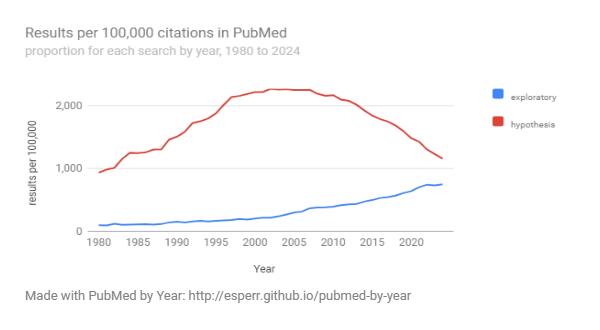"Protein" in Chinese and Japanese
[This is a guest post by Nathan Hopson] I recently received the following delightful question from Hilary Smith (University of Denver) about the origins of the term for protein in Chinese (dànbáizhì) and Japanese (tanpakushitsu). Thanks to her for pointing me down this lovely rabbit hole! The hanzi/kanji used are identical (蛋白質), though in written […]
Language LogEnglish usage in Taiwan
From a Facebook page with Army background in Taiwan: Facebook page for Voice of Han Broadcasting Network (漢聲廣播電台 hànshēng guǎngbō diàntái) from Taiwan's Ministry of National Defense The large lettering on the poster reads: zǎo ān bù wèi fēngyǔ dōu shì weather nǐ 早安 不畏風雨, 都是weather你 Good morning Not afraid of wind or rain It's […]
Language Log
The transformative power of translation
"Not Lost In Translation: How Barbarian Books Laid the Foundation for Japan’s Industrial Revolution", by Alex Tabarrok, Marginal Revolution (July 22, 2024) I am grateful toAlex Tabarrokand his colleagueTyler Cowenat Marginal Revolution University of George Mason University'sMercatus Centerfor introducing me to what is one of the most mind-boggling/blowing papers I have read in the last […]
Language Log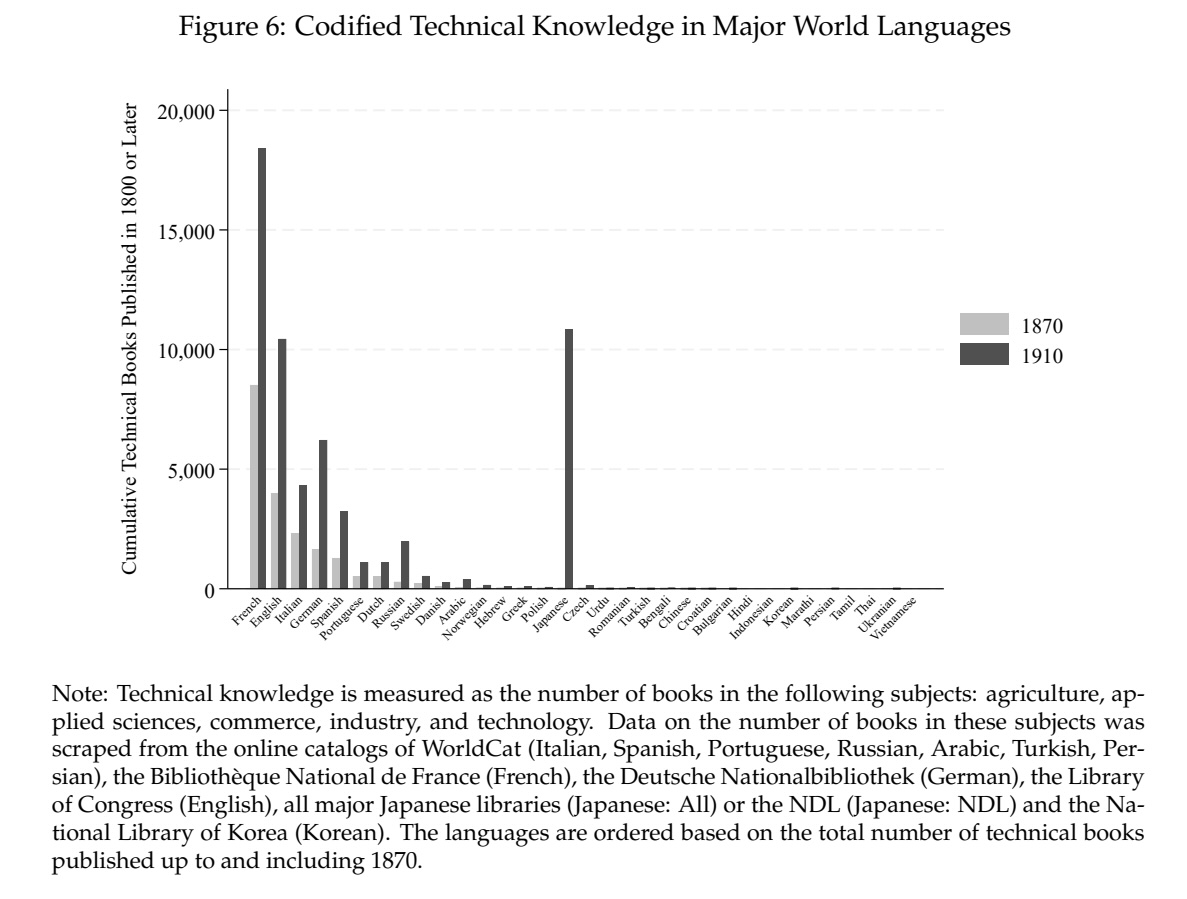
Capitalization in the constitution?
A few years ago (in "…'such matters as Opinion, not real worth, gives a value to'", 11/20/2016), based on reading Mary Astell's 1694 work A serious proposal to the ladies, for the advancement of their true and greatest interest, I asked: Why did authors from Astell's time distribute initial capital letters in the apparently erratic […]
Language LogTaiwan(ese) Taiwanese
This has become a hot button issue in recent weeks. Do we need such a term? What does it signify? Is there any other kind of Taiwanese? We have Australian English, British English, and American English; we have Canadian / Quebec French and Belgian French and Louisiana French (I love to hear it), and Swiss […]
Language LogDeutsche Zungenbrecher
"Some German tongue-twisters", posted on 21/07/2024 by StephenJones.blog Whereas the mind-boggling “tapeworm words” in my post on Some German mouthfuls are of a practical nature, the realm of fantasy opens up whole new linguistic vistas. In a stimulating article, Deborah Cole introduces the work of the Berlin-based cabaret performer, playwright, and pianist Bodo Wartke. She […]
Language LogReading Old Turkic runiform inscriptions with the aid of 3D simulation
"Augmenting parametric data synthesis with 3D simulation for OCR on Old Turkic runiform inscriptions: A case study of the Kül Tegin inscription", Mehmet Oğuz Derin and Erdem Uçar, Journal of Old Turkic Studies (7/21/24) Abstract Optical character recognition for historical scripts like Old Turkic runiform script poses significant challenges due to the need for abundant […]
Language LogGovernment dampers on AI in the PRC, part 2
"China deploys censors to create socialist AI: Large language models are being tested by officials to ensure their systems ‘embody core socialist values’", by Ryan McMorrow and Tina Hu in Beijing, Financial Times (July 17 2024) Chinese government officials are testing artificial intelligence companies’ large language models to ensure their systems “embody core socialist values”, […]
Language LogNew horizons in word sense analysis
Today's xkcd: Mouseover title: IMO the thymus is one of the coolest organs and we should really use it in metaphors more." Like all aspects of word meaning, such metaphors come and go. For example, batshit (in the metaphorical meaning "nonsense" or "crazy") came into use in the middle of the 20th century, presumably via […]
Language Log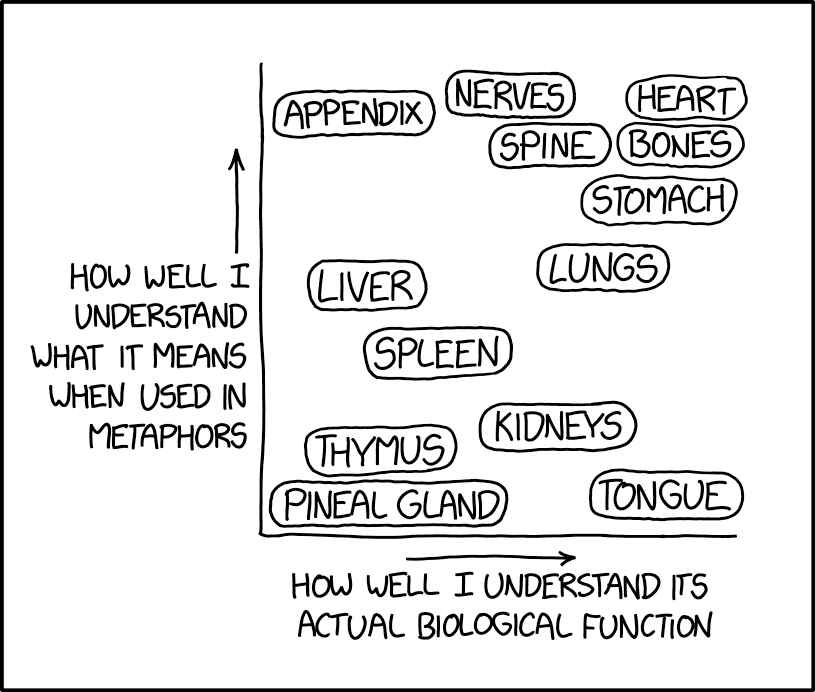
Topolect: a Four-Body Problem
From Jeff DeMarco: The fanfic fourth book in the sāntǐ 三体 ("three-body [problem]") series, translated by Ken Liu has the following sentence: Women dressed in flowing silk dresses oared elegant barges over the placid waterways, singing folk ditties in the gentle, refined accents of the Wu topolect … fāngyán 方言 (lit., "place speech", i.e., "topolect; […]
Language Log
Little Italian girl talking with her hands
Are Italians by nature more manually voluble than other people? Selected readings "Learning to speak Sicilian" (2/10/20) — some similar hand gestures "Baby talk" (12/21/10) "Baby talk, part 2" (8/19/18) "Twin talk" (3/31/11) — watch video here and here "The babbling phase: ranting toddler speaks out" (9/2/10) "Ask LL: parents' beliefs or infants' abilities?" […]
Language LogChina VPN redux
Chapter 1 A professor in China who is collaborating with a famous American professor of Chinese literature wanted to read one of my Language Log (LL) posts because he had heard that it's being widely discussed around the world. However, because of China's rigid censorship rules, he couldn't open the LL post. The Chinese professor […]
Language LogNo "good morning" and "good afternoon" in Romance Languages?
From François Lang: I hope this isn't a well-known question. I searched LL for "good morning" romance and found nothing. So here goes. (1) One can say "good evening" idiomatically in Romance languages, but not "good morning" or "good afternoon". (2) However, all three are idiomatic in Germanic languages. I'm wondering if LL […]
Language LogGovernment dampers on AI in the PRC
"China Puts Power of State Behind AI—and Risks Strangling It: Government support helps China’s generative AI companies gain ground on U.S. competitors, but political controls threaten to weigh them down", by Lia Lin, WSJ (7/16/24) Most generative AI models in China need to obtain the approval of the Cyberspace Administration of China before being released […]
Language LogThe true identity of the first Chinese translator of Lady Chatterley's Lover
There has long been a suspicion that the first Chinese translator of Lady Chatterley's Lover (1928/1932), Ráo Shùyī 饒述一, about whom next to nothing is known, was actually the scholar and theoretician of aesthetics, Zhū Guāngqián 朱光潛 (1897-1986). To give a little bit of background about the nature of the two translations of the novel, […]
Language Log"Fisherman Croc's desert song"?
Shannon McDonagh, "'What the Hell Is This?': Crocodile-Like Fossil Rewrites Triassic History", Newsweek 7/11/2024: The groundbreaking discovery of the Benggwigwishingasuchus eremicarminis reveals the presence of waterside crocodile-like creatures around the globe during the Middle Triassic. Broadly known as pseudosuchian archosaurs—four-legged, carnivorous beings with an armadillo-like coating—these creatures are now known to have existed coastally between […]
Language Log
Japanese expressions for some paranormal phenomena
Japan Subculture Research Center. A guide to the Japanese underworld, Japanese pop-culture, yakuza and everything dark under the sun. Telepathy (以心伝心) and Other Coincidences (奇遇)By jakeadelstein (Jul 10, 2024) A generous helping of creepiness from Japan. Here goes: I was writing to a former intern at Japan Subculture Research Center, Fresca, and asked her to […]
Language LogIRL reverse dictionary
… or maybe I should say "associative memory"? Or whatever we should call the emerging modes of interaction with Meta Ray-Bans? Anyhow, here's a recently re-published Girls With Slingshots comic(original in 2008): The comments include a number of old reference-librarian anecdotes. Of course, web search algorithms have been evolving towards the capabilities illustrated in the […]
Language Log
Irish eggcorns
A guest post, via email from Maitiú Ó Coimín: I just watched the interview Rob's Words on YouTube did with you last year. You mentioned that you'd like to hear about eggcorns in other languages. I think I have two for you from my first language: Irish. The first relates to the animal the squid. […]
Language LogFood in the works of Jane Austen as seen by early 20th-century Chinese
"How Jane Austen’s Early Chinese Translators Were Stumped by the Oddities of 19th-Century British Cuisine: How do you get a reader in 1930s China to understand what a mince pie is?" By Saihong Li and William Hope, The Conversation (9/15/22) / Get Pocket. Jane Austen’s (1775-1817) works are globally renowned, but they were unknown in […]
Language LogGraphic Contexts Determine Characters' Functions
[This is a guest post by J. Marshall Unger.] I do not believe it is useful, let alone necessary, to classify every character of a writing system as a phonogram, logogram, syllabogram, logosyllabogram, or any other kind of “gram.” Characters function logographically or phonographically depending on the degree to which they reflect the phonological, as […]
Language LogOpenAI blocks API traffic from China
Screenshot of emails circulating on social media: Naturally, Chinese AI developers are seriously concerned about this exclusion. See this balanced report and many others with differing viewpoints available on the internet: "Why has OpenAI blocked API traffic from China? What impact would this have on Chinese AI companies? Where does China stand on […]
Language Log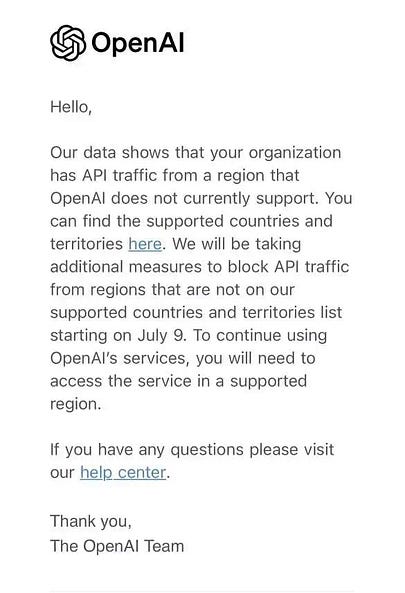
Environmental effects on language change
Frazz for 7/8/2024 and 7/9/2024: There's a long history of research (and a longer history of speculation) about the linguistic effects of temperature, altitude, genes, and other language-external factors. I dimly recall a lecturer (I think seriously?) suggesting that Grimm's Law was caused by the discovery of beer, although I haven't been able to find […]
Language Log
Top Chinese general loses his chastity
The internet has been in an uproar over the sacking by Xi Jinping of two of China's topmost military men. Exclusive | "Was fallen Chinese defence minister Wei Fenghe compromised by hostile force? A rare form of words that the Communist Party normally only applies to those accused of betrayal was used in the indictment […]
Language LogMilk tea
(To appreciate the joke at the top of the image, it helps to be familiar with the "Nobody" meme. Here the meme is used to critique companies that engage in "pinkwashing" during Pride Month and then revert to their heteronormative ways as soon as June ends.) Japanese writing on the labels: Nonhomo ノンホモ Hida 飛騨 […]
Language Log
Singing Presidents (a triumph of Chinese AI)
Wasn’t on my 2024 Bingo Card: US Lawmakers: We need to ban $NVDA GPUs sales into China, or else they will lead in AI and boost their military. Chinese social meme accounts burns through valuable Huawei Ascend compute, to make Biden and Trump sing Chinese folk songs about… pic.twitter.com/T03DwIZKp4 — Marcel Münch (@_mm85) July 9, […]
Language LogOur journey journey
In "Peevable words and phrases: journey", 5/18/2024, Victor quoted Lisa Miller, "When Did Everything Become a ‘Journey’?", NYT 5/16/2024: According to the linguistics professor Jesse Egbert at Northern Arizona University, the use of “journey” (the noun) has nearly doubled in American English since 1990, with the most frequent instances occurring online. In PubMed, where we've […]
Language Log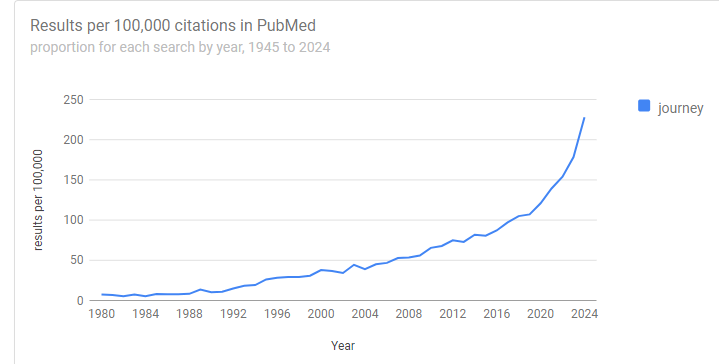
Click click
"Let’s ‘Double-Click’ on the Latest Cringeworthy Corporate Buzzword: You may want to examine or delve into the phrase, which has become pervasive in conference calls and grates on many; ‘It’s almost like a joke’", by Te-ping Chen and Nicholas G. Miller, WSJ (7/9/24) One of the fastest-spreading corporate buzzwords in recent years, “double-click” is both […]
Language LogBilingual Chinese lesbian slang dictionary
"Siting Yao’s bilingual dictionary translates Chinese lesbian slang: The London-based graphic designer illustrates unique language expressions and humorous anecdotes in her colourful, graphic guide to queer code." By Ellis Tree, It's Nice That (4 July 2024) Made for: “Chinese speakers who are interested in but unfamiliar with queer culture, English speakers who are interested in […]
Language Log
The evolving PubMed landscape
Following up on "Are LLMs writing PubMed articles?", 7/7/2024, Cervantes suggested a factor, besides LLM availability, that has been influencing the distribution of word frequencies in PubMed's index: As an investigator whose own papers are indexed in PubMed, and who has been watching the trends in scientific fashion for some decades, I can come up […]
Language Log